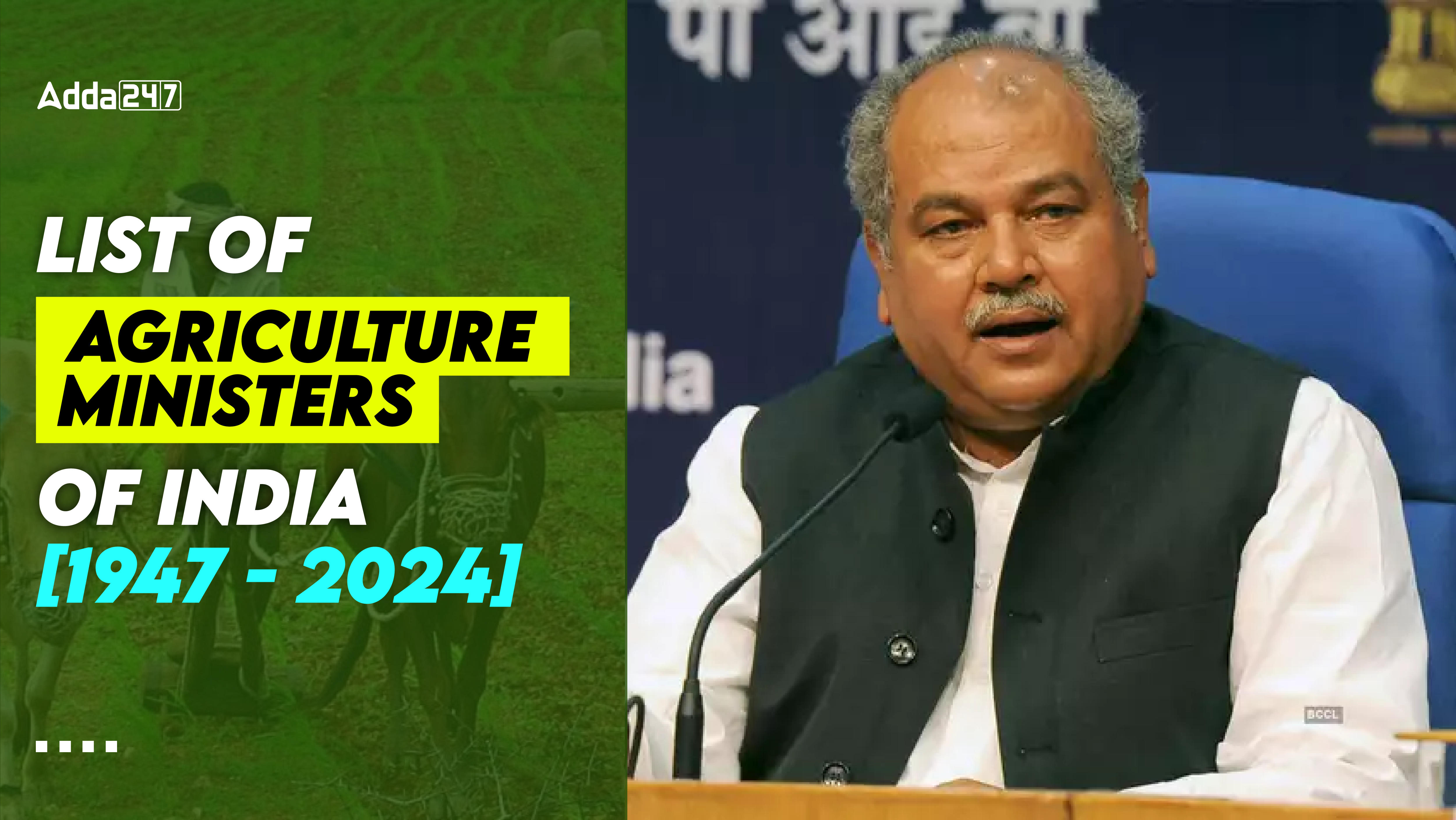Table of Contents
The Agriculture Minister plays a crucial role in determining policy, allocating funds, and representing the interests of the agricultural sector. Creating policies, overseeing spending, interacting with stakeholders, and handling emergencies are some of the duties of the Agriculture Minister. They are essential to maintaining the sustainability and growth of the industry in addition to safeguarding the well-being of farmers and rural communities.
After the freedom of India there are many leaders who served as a agriculture minister for the country. In this article we have covered all the list of the ministers from 1947 to 2024. Let’s dive in the article to know about India’s agriculture ministers list.
Agriculture Ministers of India – List
For the farming community in India, the Minister of Agriculture is akin to the captain of a ship. They make decisions about policies and programs to support farmers and ensure that they have the resources necessary to raise crops successfully. Check the following table for a complete list of agriculture ministers in India.
| Agriculture Ministers of India List | ||
|---|---|---|
| Years | Minister | Political Party |
| 1947 – 1948 | Rajendra Prasad | Indian National Congress |
| 1948 – 1950 | Jairamdas Daulatram | Indian National Congress |
| 1950 – 1952 | Kanaiyalal Maneklal Munshi | Indian National Congress |
| 1952 – 1954 | Rafi Ahmed Kidwai | Indian National Congress |
| 1954 | Panjabrao Deshmukh | Indian National Congress |
| 1954 – 1957 | Ajit Prasad Jain | Indian National Congress |
| 1957 – 1959 | S. K. Patil | Indian National Congress |
| 1959 – 1963 | Swaran Singh | Indian National Congress |
| 1963 – 1966 | Chidambaram Subramaniam | Indian National Congress |
| 1966 – 1967 | Jagjivan Ram | Indian National Congress |
| 1967 – 1971 | Fakhruddin Ali Ahmed | Indian National Congress (R) |
| 1980 – 1984 | Rao Birender Singh | Indian National Congress (R) |
| 1984 – 1986 | Buta Singh | Indian National Congress (I) |
| 1986 – 1988 | Gurdial Singh Dhillon | Indian National Congress (I) |
| 1988 – 1989 | Bhajan Lal | Indian National Congress (I) |
| 1989 – 1990 | Chaudhary Devi Lal | Janata Dal |
| 1991 – 1996 | Balram Jakhar | Indian National Congress |
| 1999 – 2000 | Nitish Kumar | Samata Party |
| 2004 – 2009 | Sharad Pawar | Nationalist Congress Party |
| 2014 – 2015 | Radha Mohan Singh | Bharatiya Janata Party |
| 2019 – 2023 | Narendra Singh Tomar | Bharatiya Janata Party |
| 2023- Present | Shri Arjun Munda | Bharatiya Janata Party |
Who is the Agriculture Minister of India at Present
Shri Arjun Munda, as the Minister of Agriculture & Farmers Welfare, is the Agriculture Minister of India. He also works on improving farming infrastructure like roads and irrigation systems to make it easier for farmers to do their work. He’s involved in giving financial support and insurance to farmers, especially during tough times like crop failures or natural disasters.
Additionally, he focuses on educating farmers about modern farming techniques and technologies that can help them increase their crop yields and incomes. With his efforts, he aims to ensure that farming remains a sustainable and prosperous livelihood for millions of farmers across India.
To know about other ministers in his cabinet, check the table below:
| Name | Designation | Office | |
|---|---|---|---|
| Shri Arjun Munda | Honourable Minister of Agriculture & Farmers Welfare | agrimin.india[at]gmail[dot]com | 23383370, 23782691 |
| Shri Tejaswi S Naik | Private Secretary to Minister | 23383370, 23782691, 23782594 | |
| Shri Kuldeep Singh Rathore | OSD to Honourable AM | 23383370, 23782691 | |
| Shri Avinash K Arya | First Personal Assistant to Honourable AM | avinash.arya[at]gov[dot]in | 23383370, 23782594 |
Roles and Responsibilities of Agriculture Minister
An essential part of managing the agricultural sector for the country’s economy and food security in India is the responsibility of the Agriculture Minister. The following are the main positions and duties:
- Policy Formulation: Developing strategies and policies to support rural development sustainable agriculture and growth is the responsibility of the Agriculture Minister. Crop production, irrigation, land management, agricultural research, and marketing are just a few topics covered by these policies.
- Agricultural Programs and Initiatives: They are in charge of distributing funds and other resources. Funding for initiatives including crop insurance plans research and development farmer subsidies and the development of agricultural infrastructure should be prioritized.
- Legislative Role: The Agriculture Minister introduces bills and amendments targeted at resolving matters relevant to agriculture to represent the agricultural sector in the legislative process. To pass laws and regulations that promote the growth of the industry and solve issues that farmers face they collaborate with other governmental entities and interested parties.
- Crisis Management: The Agriculture Minister is essential in organizing relief efforts offering assistance to impacted farmers and putting policies in place to lessen the sector’s effects when there is an agricultural crisis such as a natural disaster crop failure or price swings.
- International Relations: In talks trade agreements and international forums they speak for the nation’s agricultural interests. To increase the agricultural sector’s competitiveness in the international arena this entails promoting favorable trade policies addressing concerns about market access and tariffs and encouraging agricultural exports.
- Monitoring and Assessment: Supervising the execution of agricultural projects and programs keeping an eye on their advancement and assessing their effects on the industry growth farmer’s means of subsistence and the objectives of food security. They work to continuously improve agricultural policies and interventions while ensuring accountability and transparency in the use of resources.
- Supporting Sustainable Agricultural Practices: Supporting integrated pest management organic farming and water conservation are examples of sustainable agricultural practices. They seek to ensure the agricultural sector’s long-term viability by reducing environmental degradation and adjusting to climate change.
Who Appoint the Agriculture Minister of India
The Agriculture Minister is appointed by the Prime Minister of India. The selection is usually based on the minister’s experience, expertise, and commitment to the welfare of the agricultural sector. The Agriculture Minister of India is appointed by the Prime Minister of the country. Typically every minister holds office for a tenure of 5 years and the same goes for the Agriculture Minister of India.
Factors affecting the appointment of Agriculture Minister
- Political Dynamics
- Government Reshuffles
- Individual Appointments
- Elections
- Performance and Stability
- Continuity vs. Change
Some Facts of Agriculture Ministers of India
- Rafi Ahmed Kidwai was India’s first minister of agriculture after independence holding the position from 1947 to 1953.
- Having served multiple terms as Agriculture Minister Sharad Pawar is among the longest-serving ministers in this role.
- In 1947 the establishment of the Agriculture Minister’s Office signified the sector’s recognition as crucial.


![List of Agriculture Ministers of India [1947 - 2024]_3.1](https://st.adda247.com/https://www.adda247.com/jobs/wp-content/uploads/sites/22/2024/04/20145751/10536AgricultureMahaPack1702032929-1-300x300.webp)
![List of Agriculture Ministers of India [1947 - 2024]_4.1](https://www.adda247.com/jobs/wp-content/uploads/sites/22/2024/11/13155615/test-prime.webp)

 BPNL Recruitment 2025 Notification Out, ...
BPNL Recruitment 2025 Notification Out, ...
 ICAR AIEEA PG Horticulture Syllabus 2025...
ICAR AIEEA PG Horticulture Syllabus 2025...
 MPPSC Food Safety Officer Notification 2...
MPPSC Food Safety Officer Notification 2...


 Adda247 Job portal has complete information about all Sarkari Jobs and Naukri Alerts, its latest recruitment notifications, from all state and national level jobs and their updates.
Adda247 Job portal has complete information about all Sarkari Jobs and Naukri Alerts, its latest recruitment notifications, from all state and national level jobs and their updates.